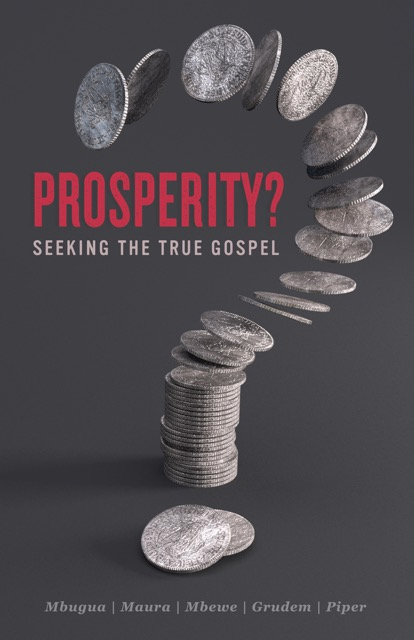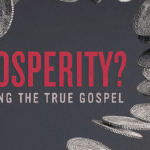Over the past few years, I’ve enjoyed meeting and getting to know Ken Mbugua from Nairobi, Kenya. I’m excited about how God is at work in his life and ministry, preparing him for leading the church there. In 2013, my son and I spent a little time with Ken and his team at Emanuel Baptist Church. He recently completed an internship at Capitol Hill Baptist Church in Washington, D.C.
Ken is one of the primary contributors to a recent book focused on dealing with prosperity teaching in Africa. The Gospel Coalition International Outreach is partnering with ACTS Kenya to put this book into the hands of thousands of church leaders all over Africa. To learn how you can join with us in this effort, visit our Relief Project page for Prosperity? Seeking the True Gospel.
Why is prosperity theology such an important issue to address for Africa?

There are millions of Africans attending churches where the only message they hear is the prosperity gospel. The churches that preach this false gospel are everywhere, but sadly they seem to thrive even more in the poor communities of urban areas. Famous prosperity gospel preachers in the United States are very popular here in Africa. Their books are readily available, and their sermons are played on local television. Many are caught up either as preachers or followers without ever having heard the true gospel. A softer version of the same false teaching is affecting even mainstream churches.
From the Jerusalem Council to the Council of Nicea, the church has been called to contend for the faith against many different distortions. The primary distortion the gospel faces in Africa is the prosperity gospel. Although many believers and preachers oppose it, there are few resources addressing it. In many ways the prosperity gospel is being allowed to raid and plunder the church freely. We need more voices in the African church to put up a fight against this false gospel before it’s too late.
Africa needs the gospel more than it needs food aid. We need the gospel more than we need democracy. The prosperity we need the most is not offered by the American dream.
In what ways does this teaching negatively affect the lives of individual Christians?
There are poor people giving their small earnings to false gospel teachers in exchange for a false hope that will often leave them broken and doubting. There are middle class people getting conned out of their wealth, being told to give up their cars, land, and so on to the pastor. There are thousands of Christians attending church every Sunday to hear messages void of the gospel but full of self-help poisonous fluff. There is the constant shame brought to Christ and his church at large when the media exposes one false teacher after another.
Right now in Kenya this false gospel is destroying the foundations of the faith that are supposed to sustain Christians through times of persecution. As persecution of Christians increases in Kenya, we need Christians who truly believe that dying is gain and that Jesus is worth it all a million times over. The prosperity gospel, soft version or otherwise, is doing nothing but harm to a church that might soon be called to the same thing the church in Smyrna was called to—“faithfulness unto death” (Rev. 2:10).
How does the biblical gospel bring the truth to bear on this false teaching?
The biblical gospel tells us that the problem is far worse than the prosperity gospel suggests. Our greatest problem is not that we are broken or sick. Our greatest problem is that the God of the universe is righteous in his holy anger, and he is coming to pour out his divine wrath on all who do not worship him as God. The biblical gospel tells us that the good news is far better than the fact that we will be made healthy and wealthy (even though this will be true of all believers in the new heavens and the new earth). The biblical gospel tells us that we get God as our treasure. We get to worship God as God. He sets us free from all other posers that promised joys they could never provide.
Africa needs the gospel more than it needs food aid. We need the gospel more than we need democracy. The prosperity we need the most is not offered by the American dream.
As a contributor to this book, what are your hopes for the effect that it could make?
 All that we are offering to God with this little book is less than the little boy’s lunch he once used to feed a multitude (John 6:1-15). We have seen God do amazing things with it already. Bible schools have started using it to prepare their pastoral students to defend the gospel. Other missionaries have bought multiple copies and distributed them at conferences in villages far beyond our reach. Hundreds of high school students have studied the book and written research papers on it.
All that we are offering to God with this little book is less than the little boy’s lunch he once used to feed a multitude (John 6:1-15). We have seen God do amazing things with it already. Bible schools have started using it to prepare their pastoral students to defend the gospel. Other missionaries have bought multiple copies and distributed them at conferences in villages far beyond our reach. Hundreds of high school students have studied the book and written research papers on it.
We can only hope that God will continue to use this much-improved version of the book to reach even more pastors and church members with the true gospel. We pray that many who believe the prosperity gospel will be unshackled and that many who have not yet been trapped will be protected from it. We pray that God will bring the truth of the gospel to those who are naively holding on to a false gospel. We pray that the sheep will hear the voice of their shepherd and follow him.
Learn more about TGC International Outreach’s mission of Theological Famine Relief for the Global Church. And watch this video interview with Ken during IO’s 2013 visit to Nairobi.
Involved in Women’s Ministry? Add This to Your Discipleship Tool Kit.
 We need one another. Yet we don’t always know how to develop deep relationships to help us grow in the Christian life. Younger believers benefit from the guidance and wisdom of more mature saints as their faith deepens. But too often, potential mentors lack clarity and training on how to engage in discipling those they can influence.
We need one another. Yet we don’t always know how to develop deep relationships to help us grow in the Christian life. Younger believers benefit from the guidance and wisdom of more mature saints as their faith deepens. But too often, potential mentors lack clarity and training on how to engage in discipling those they can influence.
Whether you’re longing to find a spiritual mentor or hoping to serve as a guide for someone else, we have a FREE resource to encourage and equip you. In Growing Together: Taking Mentoring Beyond Small Talk and Prayer Requests, Melissa Kruger, TGC’s vice president of discipleship programming, offers encouraging lessons to guide conversations that promote spiritual growth in both the mentee and mentor.

































